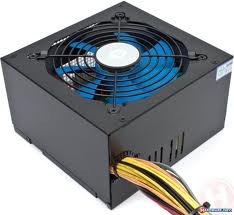Tips for Choosing a Computer Power Supply Unit
Page 1 of 1
 Tips for Choosing a Computer Power Supply Unit
Tips for Choosing a Computer Power Supply Unit

The PSU or Power Supply Unit is one of the most vital parts of your computer; it is responsible for providing power to your computer's components, such as your processor, video card and hard drives. Thus, careful consideration should be given when choosing a PSU for your computer. It's really not as complicated as you think.
I categorize PSUs into two groups. Generic/standard PSUs and true-rated/branded PSUs. Generic PSUs are the ones that you usually receive together with the tower case. The components you can power up are limited. You can only power up around 2 or more drives and it won't be able to fully provide enough juice for high-end video cards, which is probably the most power hungry component of a computer at full load. It may be able to handle it at first but as time passes, there's a huge possibility that it will fail. And most of the time the maximum output they claim to give out isn't accurate. They may say it's a 500-watt power supply but in reality it can only provide sufficient power at 300 watts or so. And, if you push the power supply just a little over its threshold, it may fail and damage your computer.
True-rated PSUs (branded ones) provide enough power for extra hardware components. They are usually more efficient in powering up powerful video cards. They are a lot more expensive than generic power supplies but they do their job well. But of course, there's still a chance that your branded power supply may fail.
First and foremost, you should consider the hardware components that you have in your computer and what you're going to use your computer for. If you're only going to use your computer for internet, desktop publishing, writing documents and presentations, playing solitaire and other simple tasks, a generic power supply unit will suffice.
However, if you are going to use your computer for video games and intensive computing (such as 3D modeling and animation), your processor and video card will need more power thus, it is suggested that you buy a branded and true-rated power supply. If you're really into gaming and if you're planning on using SLi or CrossFireX (multiple video cards), a true-rated power supply with high wattage (700 watts) that support those technologies is a must.
Also, if you have a lot of hard drives and optical drives, lots of case fans and lights or an elaborate cooling system, you'll need extra power. Plugging it all into a generic power supply may be enough but there is a higher risk of the PSU failing at some point due to the heavier load.
Another advantage of branded power supplies is its features. They usually have extra power connectors such as extra SATA power connectors, molex connectors (the white ones with 4 pins) for fans and 6-pin connectors for video cards. Generic power supplies usually do not have that 6-pin video card connector. You have to make use of the molex connectors (sometimes 2 of them) with a 6-pin converter to power up the video card. It's a waste since you won't be able to use them anymore if you need to add a disk drive.
One of the good features of a branded power supply is its power management and maintenance. Almost all of them are auto-voltage meaning you can plug them on any wall socket and will adjust automatically depending on the components you plug in thus, saving electricity (and lowering your bill). They have protective features from power surges and sudden loss of electricity which in turn, protect your computer's components.
When it comes to the actual brand of the power supply, there are a lot of reputable power supplies in the market. We have Thermaltake, Corsair, AcBel, HEC, Coolermaster, etc. But again, it will always be your choice which you will buy for your PC.
There you have it. It is really important to consider what kind of power supply you're going to use for your computer. It should be able to manage your components' power requirements well. This will also prevent, or at least lessen the risk of, damaging your computer components. The motherboard is usually the first and most common victim of power supply failures. It won't hurt to shell out extra money for a branded power supply. They usually last longer and can withstand constant heavy loads way better than generic power supplies.
Source:
Errel - Tech Expert
MSI , Philippines
Source: Jay Tech
advantage of branded is quality.
advantage of generic is price.
Page 1 of 1
Permissions in this forum:
You cannot reply to topics in this forum